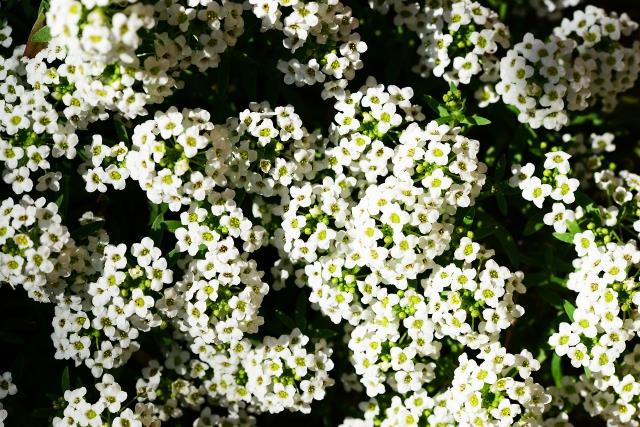By Beatrice Hawkins
One of my all-time favourite things to grow in a garden, because it such a useful fill-in plant, is sweet alyssum or as I knew it as a child, ‘Sweet Alice’. Once you have grown it you will always have it as it self-seeds so readily and comes up anywhere there is an empty space. Many years ago in my youth it only came in white or cream, but these days many shades of pale mauve to deep purple and almost crimson are available and provide colour. I have also read of a yellow-flowering variety called ‘mountain gold’ that I’ll have to look out for. The coloured varieties do not seem, in my experience, to be as vigorous as the old common white ones and when they do self-seed, many are a paler variety than the parent plant.
At present they are blooming beautifully in my garden with no attention and have even come up in the crack at the bottom of the front steps! As my usual access to the house is through the garage I don’t even have to step over them and they look delightful. Plants have also popped up randomly throughout the garden beds and have provided colour right through the winter. When they get a bit leggy and are looking a bit disreputable, I pull them out and within a short time they are replaced by new ones without any effort from me as from seed to blooms is only about six weeks or less, and there are usually some already establishing as I remove the old ones. They are also growing randomly through the front beds and spilling very decoratively over the retaining walls. They soften the edges of the garden beds, hide a multitude of sins and act as a great ground cover and living mulch. They seem to grow and bloom through all seasons and conditions, frosty cold and baking hot, wet or dry, with little care and attention.
In my mind, one of the great heroes of the garden. White flowers are such a great foil for the other colours in a garden making them appear more vibrant by contrast…a very useful arrangement! Apparently they have very few pest or disease problems, they like most soil types provided they have good drainage and while they thrive in full sun will still bloom beautifully in part shade. The only problem they seem to have is root rot if planted in heavy, wet soils. Simply pull out and discard the affected plants, reduce watering and add some sand or other material to the soil to improve the drainage and prevent water logging.
A sweet lady, one of those delightful people, who although not related, we called ‘aunt’ out of respect and who lived down the road from me as a child, always had them growing in her garden and coming up in the cracks in the path to the shed that housed her outside laundry.
My childhood was peopled with a wonderful array of these good folk who made up for a lack of close relations. I was very privileged to grow up in that place and time and look back with very fond memories of a very free and happy childhood.
Another plant that I have seen flowering right through winter in a neighbour’s garden is the African daisy. They come in many forms and colours these days as they have been hybridised, but the common one that is white or shades of purple and always looks so good is the hardiest, and just seems to thrive in the current dry conditions.
The next event on the calendar for the Warwick Horticultural Society is the Annual Garden Competition in October and also the Spring Flower Show. Despite the atrocious drought conditions we, along with a large area of Queensland and NSW are experiencing, I know there will be many gardens in our area to be judged. Entry forms are, as usual, available from Bryson’s in Palmerin Street.
When deciding whether or not to enter your garden, just remember that we are all experiencing the same conditions and water restrictions, so the judging fields will be level.
It is still a month away and who knows, despite dire predictions, what the weather may do for us in that time. Hopefully some rain will have fallen and my lawn will have recovered and need to be mown! May I never complain again about having to do that.
*This is an old article that has been digitised so our readers have access to our full catalogue.







